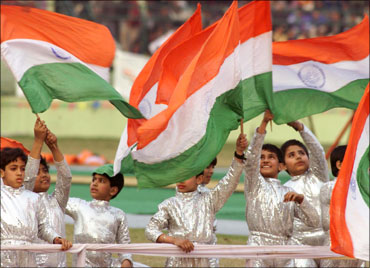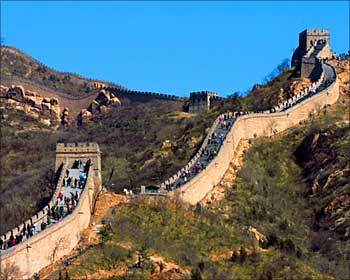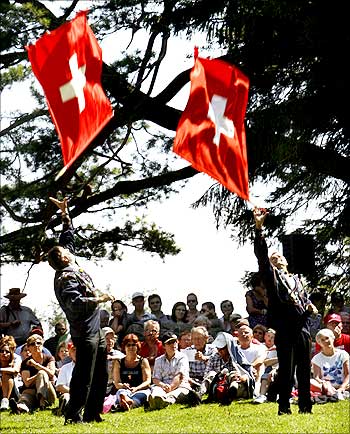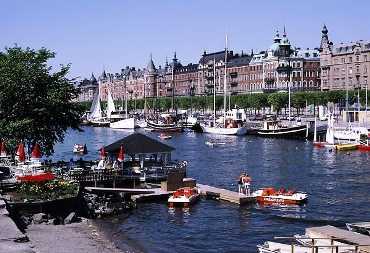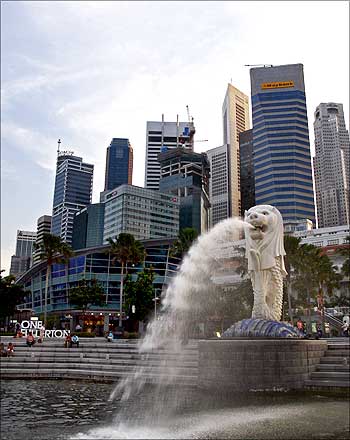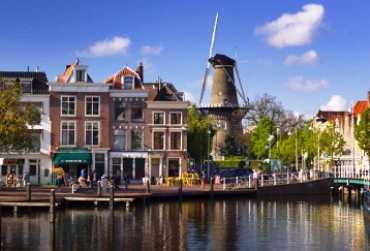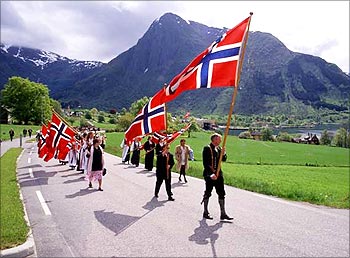 | « Back to article | Print this article |
World's most competitive nations; India 51st
Even as the Indian economy booms seemingly on steroids, in the area of global competitiveness it has slipped two positions from 49th to 51st this year, despite a small improvement in its score at 4.33 on a scale of 1 to 7.
The Global Competitiveness Report 2010-2011, released on Thursday by the World Economic Forum ahead of its Annual Meeting of the New Champions 2010 in Tianjin, China, says that India's performance was by and large stable.
India's competitiveness is based on its large market size and good results in more complex areas including financial markets (17th), business sophistication (44th), and innovation (39th). On the other hand, India has failed to improve significantly on any of the basic drivers of its competitiveness.
It ranks 104th in the health and primary education pillar, with high rates of communicable diseases and high infant mortality. Indeed, life expectancy in India is 10 years shorter than in Brazil and China.
And although primary enrollment is becoming universal, the quality of primary education remains fairly poor (98th).
Higher education also remains a weak point, with low enrollment rates at the secondary and tertiary levels.
Infrastructure (86th) is in need of upgrade, especially with respect to quality of roads, ports, and the electricity supply, with India falling 10 places in this area this year.
The macroeconomic environment continues to be characterised by persistent budget deficits, high public debt, and high inflation. Labour markets are also in need of greater efficiency and flexibility (92nd).
Click NEXT to find out where China stands and which are the world's most competitive nations . . .
World's most competitive nations; India 51st
China: 27th
The People's Republic of China continues to move up the rankings. Up two positions to 27th place, China has reinforced its position within the top 30, with a score of 4.84.
It is the only BRIC country to improve in the rankings this year, thus increasing the gap with the other three.
China's performance remains stable in most areas measured with the Index compared with last year, with its main strengths its large and growing market size, macroeconomic stability, and relatively sophisticated and innovated businesses.
The two-rank improvement is almost entirely attributable to a better assessment of its financial market (up 24 places to 57th), which has historically been a notable weak point. This is the result of easier access to credit and financing through equity markets, banks, and venture capital, which has been accompanied by a slight improvement in the perceived soundness of the banking sector (60th, up six places).
Technological readiness is another area where China has traditionally underperformed (78th), with low ICT penetration, although rates are surging. In 2009 alone, China added over 100 million mobile telephone subscriptions and some 86 million new Internet users.
How the ranking is done
The Global Competitiveness Report's competitiveness ranking is based on the Global Competitiveness Index, developed for the World Economic Forum by Sala-i-Martin and introduced in 2004.
The GCI is based on 12 pillars of competitiveness, providing a comprehensive picture of the competitiveness landscape in countries around the world at all stages of development.
The pillars are: institutions, infrastructure, macroeconomic environment, health and primary education, higher education and training, goods market efficiency, labour market efficiency, financial market development, technological readiness, market size, business sophistication, and innovation.
The rankings are calculated from both publicly available data and the Executive Opinion Survey, comprehensive annual survey conducted by the World Economic Forum together with its network of Partner Institutes (leading research institutes and business organisations) in the countries covered by the study.
Click NEXT to find out which are the world's most competitive nations . . .
World's most competitive nations; India 51st
Switzerland: 1st
Switzerland retains its 1st place position, characterized by an excellent capacity for innovation and a very sophisticated business culture, ranked 4th for its business sophistication and 2nd for its innovation capacity.
Switzerland's score was 5.63.
Switzerland's scientific research institutions are among the world's best, and the strong collabouration between the academic and business sectors, combined with high company spending on R&D, ensures that much of this research is translated into marketable products and processes, reinforced by strong intellectual property protection and government support of innovation through its procurement processes.
This strong innovative capacity is captured by the high rate of patenting (158.95 per million inhabitants) in the country, for which Switzerland ranks 7th worldwide on a per capita basis.
Public institutions in Switzerland are among the most effective and transparent in the world (5th), receiving an even better comparative assessment this year than in past years. Governance structures ensure a level playing field, enhancing business confidence; these include an independent judiciary, strong rule of law, and a highly accountable public sector.
Competitiveness is also buttressed by excellent infrastructure (6th), a well-functioning goods market (4th), and a highly developed financial market (8th) as well as a labour market that is among the most efficient in the world (2nd, just behind Singapore's).
Click NEXT to read on . . .
World's most competitive nations; India 51st
Sweden: 2nd
Sweden has moved ahead of Singapore and the United States to claim 2nd position this year. Sweden scores 5.56.
The country benefits from the world's most transparent and efficient public institutions, with very low levels of corruption and undue influence and a government that is considered to be one of the most efficient in the world: public trust of politicians is ranked a high 3rd.
Private institutions also receive excellent marks (ranked 3rd), with firms that demonstrate the utmost ethical behaviour (ranked 1st), strong auditing and reporting standards, and well-functioning corporate boards. Goods and financial markets are also very efficient, although labour markets lack flexibility.
Combined with a strong focus on education over the years (ranked 2nd for higher education and training) and the world's strongest technological adoption (ranked 1st in the technological readiness pillar), Sweden has developed a very sophisticated business culture (2nd) and is one of the world's leading innovators (ranked 5th).
These characteristics come together to make Sweden one of the most productive and competitive economies in the world.
Click NEXT to read on . . .
World's most competitive nations; India 51st
Singapore: 3rd
Singapore maintains its position at 3rd place, still the highest-ranked country from Asia. The country's institutions continue to be assessed as the best in the world, ranked 1st for both the lack of corruption in the country and government efficiency. Singapore score 5.48.
Singapore places 1st for the efficiency of its goods and labour markets and 2nd for its financial market sophistication, ensuring the proper allocation of these factors to their best use.
Singapore also has world-class infrastructure (ranked 5th), with excellent roads, ports, and air transport facilities. In addition, the country's competitiveness is buttressed by a strong focus on education, providing individuals with the skills needed for a rapidly changing global economy.
In order to strengthen its competitiveness further, Singapore could encourage even stronger adoption of the latest technologies as well as policies that enhance the sophistication of its companies.
Click NEXT to read on . . .
World's most competitive nations; India 51st
The United States: 4th
The United States continues the decline that began last year, falling two more places to 4th position. America score 5.43.
While many structural features that make its economy extremely productive, a number of escalating weaknesses have lowered the US ranking over the past two years.
US companies are highly sophisticated and innovative, supported by an excellent university system that collaborates strongly with the business sector in R&D.
Combined with the scale opportunities afforded by the sheer size of its domestic economy -- the largest in the world by far -- these qualities continue to make the United States very competitive. Labour markets are ranked 4th, characterized by the ease and affordability of hiring workers and significant wage flexibility.
In addition to the macroeconomic imbalances that have been building up over time, there has been a weakening of the United States' public and private institutions, as well as lingering concerns about the state of its financial markets.
Click NEXT to read on . . .
World's most competitive nations; India 51st
Germany: 5th
Germany has moved up two places to 5th position. It score 5.39.
The macroeconomic environment has improved compared with other advanced economies (up from 30th to 22nd in this pillar). Germany is ranked 2nd for the quality of its infrastructure, with particularly good marks for its transport and telephony and electricity infrastructure.
Its goods market is efficient (21st), with intense local competition (2nd) and effective antitrust policy.
Germany has very sophisticated businesses, ranked 3rd, just behind Japan and Sweden; German businesses are also aggressive in adopting technologies for productivity enhancements (10th).
These attributes allow Germany to benefit greatly from its significant market size (5th). On the other hand, Germany's labor market remains rigid (126th for the labor market flexibility subpillar), where a lack of flexibility in wage determination and the high cost of firing provide a hindrance to job creation (although this has admittedly helped to keep unemployment down during the crisis).
Click NEXT to read on . . .
World's most competitive nations; India 51st
Japan: 6th
Japan moves up two places to 6th overall, maintaining its performance compared with last year, while some other countries in the top 10 have weakened (its score since last year remains unchanged). Japan score 5.37.
Japan continues to enjoy a major competitive edge in the areas of business sophistication and innovation, and is ranked 1st and 4th, respectively, in these two pillars. Company spending on R&D remains high and the country benefits from the availability of many scientists and engineers buttressing a strong capacity for innovation.
Indeed, in terms of innovation "output," this pays off with a rate of patenting per capita (279.1 per million inhabitants) that is 2nd worldwide, just behind the United States.
The country's overall competitive performance, however, continues to be dragged down by its macroeconomic weaknesses, with high budget deficits over several years (ranked 134th), which have led to the build-up of one of the highest public debt levels in the world (217.6 per cent of GDP in 2009, corresponding to a 137th rank, or second to last on this indicator).
Japan's rise in the rankings can in large part be traced to the fact that its main areas of weakness, linked to macroeconomic instability and weaknesses in the banking sector, for example, have now become concerns for many other countries.
Click NEXT to read on . . .
World's most competitive nations; India 51st
Finland: 7th
Finland and Denmark, while placed a bit further behind Sweden this year, continue to be ranked among the most competitive economies in the world, at 7th and 9th positions, respectively. Finland too scores 5.37.
Their macroeconomic environments are healthy, with government budgets approximately in balance through 2009, narrow interest rate spreads (especially in Finland), and excellent country credit ratings.
Similar to Sweden, they have among the best-functioning and most transparent institutions in the world, as in past years.
They also continue to occupy top positions in the higher education and training pillar, the positive result of a strong focus on education over recent decades.
This has provided the workforce with the skills needed to adapt rapidly to a changing environment and has laid the ground for their high levels of technological adoption and innovation.
Click NEXT to read on . . .
World's most competitive nations; India 51st
The Netherlands: 8th
The Netherlands moves up two positions to 8th place. Dutch businesses are highly sophisticated (ranked 5th) and are among the most aggressive internationally in absorbing new technologies for productivity enhancements (ranked 3rd for their technological readiness).
The Netherlands score 5.33.
The country's excellent educational system (ranked 8th and 10th for the two related pillars) and efficient factor markets, especially goods markets (ranked 8th), are highly supportive of business activity.
The Netherlands is also characterized by a comparatively stable macroeconomic environment, improving on a relative basis compared with last year.
The country's competitiveness would be further enhanced by introducing more flexibility into the labour market (ranked 80th on this subpillar).
Click NEXT to read on . . .
World's most competitive nations; India 51st
Denmark: 9th
A marked difference among the Nordic countries relates to labour market flexibility.
Denmark (ranked 5th in this pillar) continues to distinguish itself as having one of the most efficient labour markets internationally, with more flexibility in setting wages, firing, and therefore hiring workers than in the other Nordics and in most European countries more generally.
Denmark score 5.32 on scale of 1 to 7.
Click NEXT to read on . . .
World's most competitive nations; India 51st
Canada: 10th
Canada has dropped one place this year to 10th, with a stable performance and rounding out the top 10. It scrores 5.30.
Canada benefits from highly efficient markets (with goods, labour, and financial markets ranked 11th, 6th, and 12th, respectively), well-functioning and transparent institutions (11th), and excellent infrastructure (9th).
In addition, the country has been successful in nurturing its human resources: it is ranked 6th for health and primary education and 8th for higher education and training.
Improving the sophistication and innovative potential of the private sector, with greater R&D spending and producing higher on the value chain, would enhance Canada's competitiveness and productive potential going into the future.
Click NEXT to read on . . .
World's most competitive nations; India 51st
Hong Kong SAR: 11th
For the third consecutive year, Hong Kong SAR retains its position at 11th overall, with a slight improvement in score. It scores 5.27.
Hong Kong maintains its leadership in measures of financial market development and, for the first time, tops the infrastructure pillar. The quality of transport, energy, and telephony infrastructure is simply outstanding, with a score of 6.8 out of 7 in the pillar.
In total, Hong Kong appears in the top 10 of six of the twelve GCI pillars. One of the world's major trade hubs, the crisis hit Hong Kong quickly and strongly, with its economy growing at a subdued rate in the second half of 2008 and contracting by 2.7 per cent in 2009.
But Hong Kong's economy has proved resilient and the IMF predicts a growth rate of about 5 per cent for 2010. It offers one of the world's most business friendly environments thanks to world-class institutions, infrastructure, market efficiency, and the dynamism of its financial sector, and even slightly improves in each these dimensions.
In particular, Hong Kong ranks behind only Singapore for government efficiency.
Click NEXT to read on . . .
World's most competitive nations; India 51st
The United Kingdom: 12th
After having fallen four positions over the past two years, the United Kingdom moves up one spot to 12th place this year, with a stable performance. The UK scores 5.25.
The country benefits from clear strengths, such as the efficiency of its labour market (8th), standing in contrast to the rigidity of many other European countries.
The country continues to have sophisticated and innovative businesses that are highly adept at harnessing the latest technologies for productivity improvements and operating in a very large market (ranked 6th for market size).
These are all characteristics that are important for spurring productivity enhancements. While somewhat improved since last year, the macroeconomic environment remains the country's greatest competitive weakness, with deficit spending that must be reined in to provide a more sustainable economic footing going into the future.
Click NEXT to read on . . .
World's most competitive nations; India 51st
Taiwan, China: 13th
Taiwan, China ranks 13th, one place lower than last year. Taiwan ranks among the top 20 economies in nine pillars, but its performance in three of them holds the economy back from its full competitiveness potential: institutions, financial market development, and labour market efficiency.
Taiwan scores 5.21.
The quality of the institutional framework continues to improve although by small increments, now standing at 35th position, up from 40th in 2008.
Thanks to greater efficiency, Taiwan has improved by 19 positions in the financial market development pillar to 35th, a category where it used to place below the 50th mark.
The third area of relative weakness is its labour market (34th), where the situation continues to deteriorate with respect to the flexibility. Given its many strengths, improvements in these areas would make Taiwan an even more competitive economy.
Click NEXT to read on . . .
World's most competitive nations; India 51st
Norway: 14th
The Nordic countries have always been well positioned in the ranking, with Norway at 14th. In Latin America, Chile (30th) is the highest ranked country, followed by Panama (53rd) Costa Rica (56th) and Brazil.
Norway scores 5.14.
Among the three other BRIC economies, Brazil (58th), India (51st) and Russia (63rd) remain stable.
Several countries from the Middle East and North Africa region occupy the upper half of the rankings, led by Qatar (17th), Saudi Arabia (21st), Israel (24th), United Arab Emirates (25th), Tunisia (32nd), Kuwait (35th) and Bahrain (37th), with most Gulf States continuing their upward trend of recent years.
In sub-Saharan Africa, South Africa (54th) and Mauritius (55th) feature in the top half of the rankings, followed by second-tier best regional performers Namibia (74th), Botswana (76th) and Rwanda (80th).
Pakistan ranks a poor 123rd.
Click NEXT to read on . . .
World's most competitive nations; India 51st
France: 15th
France is ranked 15th, moving up one place since last year and demonstrating a number of competitive strengths. The country's infrastructure is among the best in the world (ranked 4th), with outstanding transport links, energy infrastructure, and communications.
France scores 5.13.
The health of the workforce and the quality and quantity of education provision are other clear strengths (ranked 16th for health and primary education and 17th for higher education and training), providing the economy with a healthy and educated workforce.
These elements have provided the basis for a business culture that is aggressive in adopting new technologies for productivity enhancements (ranked 12th for technological readiness).
In addition, the sophistication of its business culture (12th in the business sophistication pillar) and its leadership in the area of innovation (19th in the innovation pillar), buttressed by a highly developed financial market (ranked 16th), are important attributes that have helped to boost the country's growth potential.
On the other hand, France's competitiveness would be enhanced by injecting more flexibility into its labour market, ranked a low 105th because of the strict rules on firing and hiring as well as the poor labour-employer relations in the country.
